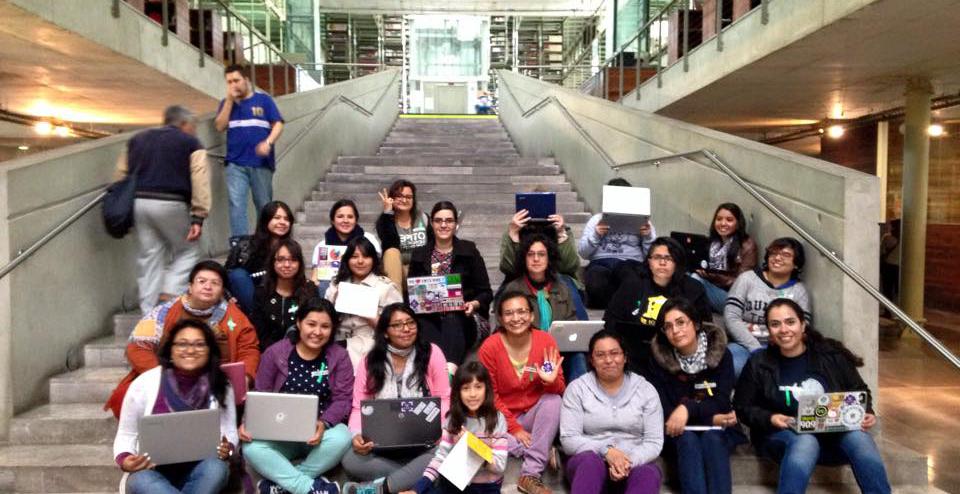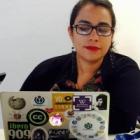
Photograph of Editatona Mujeres Internacionales en la Biblioteca Vasconcelos, México by Wotancito. Creative Commons Attribution Share Alike License. Source: Wikimedia Commons.
Translated from here
Thousands of people voluntarily take on the task of writing, expanding, correcting and improving millions of articles in Wikipedia, the free encyclopaedia. But the majority are men. The most recent figures, dating from 2012, are not only discouraging but intolerable in a society seeking equity: women account for only 10% of those involved in editing Wikipedia. In other words, only one in 10 Wikipedians is a woman.
Only one in 10 Wikipedians is a woman
Why should we be concerned about this? Consider this: only 16% of all the biographies on Wikipedia in Spanish are about women, and many of these articles have a machista and sexist bias – for example, when we read about a woman we will generally find a family or romantic relationship with a man, we will be told her marital status, whether she is a mother, perhaps even her height and measurements, etc. What is most important here is that these figures clearly reveal that the principal reference work on the internet is lacking the vision of those of us who make up half the population of the planet.
But why are there so few women editing Wikipedia? Among the reasons we have found is that, as a voluntary project, it depends on having free time, which women lack. We live in a world of imposed gender roles in which women have paid jobs, or are studying, in addition to their caring work: looking after the house and the children. At the end of the working day we spend our spare time consuming internet content, not generating it.
Another reason is related to the use of information and communications technologies (ICTs). Technology is an environment largely determined by the opinions, ideas and hypotheses of men, and some women lack the confidence to use technology because it has not been a daily reality in our lives, and we have repeatedly been told that we have no aptitude for it. It is no coincidence that the figures for women entrants to engineering studies and bachelor’s degrees in computing sciences are very similar to those for women’s presence on Wikipedia. In Mexico, 80% of those beginning some type of engineering course are men, and in Argentina, a survey showed that teenage girls know that computer-related subjects are strongly oriented towards boys. The US-based organisation Girls Who Code showed that the situation, far from improving, is getting worse. In 1984, 37% of computer science graduates in the United States were women, while today the figure is only about 18%. Clearly, a girl who wishes to relate in some way to the internet environment will be faced with a world of men – with all that that entails.

On July 2th, 2016 was held "Women's Human Rights" editatona at Mexico City Women Institute offices, Mexico City, Mexico. The event was organized by Instituto de las Mujeres de la Ciudad de México and Wikimedia Mexico. Photograph by ProtoplasmaKid. Creative Commons Attribution Share Alike License. Source: Wikimedia Commons.
Last, but not least, it is our own lack of self-confidence that undermines us. In a world that demarcates men’s and women’s professions, where language serves to invisibilise, where science and technology are constructed around masculine names, where we are told to “study a woman’s subject", we come to digital projects – not just Wikipedia – with a defensive attitude toward what our work as women can represent. If this is how our real-life contributions are treated, what can we expect from Wikipedia, where the welcome message we receive for our actions will certainly have been written by a man?
In a world that demarcates men’s and women’s professions, where language serves to invisibilise, where science and technology are constructed around masculine names, where we are told to “study a woman’s subject", we come to digital projects – not just Wikipedia – with a defensive attitude toward what our work as women can represent.
This last point is the most important, since day by day we find that our opinions are not listened to, but ignored and undervalued. When we arrive at Wikipedia, it is highly likely that our contributions will be subjected to additional scrutiny, and where it is necessary to argue one’s case, many women do not feel up to initiating and sustaining an argument, confronting men who have edited and written thousands of articles.
Editatonas in Mexico
In November 2014, some women Wikipedia editors from the Wikipedia Mexico chapter thought about how we could change things and tackle some of the issues described above. We thought of holding an event exclusively for women where we could learn and share information about Wikipedia just among ourselves, talking about our needs and failures in the project, but also finding solutions by uniting our strengths. And we also wanted to think about specific topics that global Wikimedia events organised by men simply do not take into consideration.
In our women’s world we are delegated, by default, the responsibility for the care of our children, and often, additionally, nieces, nephews, grandparents and cousins. What about women who want to participate in editing but cannot do so because they have to look after children? We thought about having a crèche to provide child care. What topics interest us as women, apart from the agenda determined by men? We asked one another these questions, without fear of embarrassment or of being ridiculed for not knowing certain facts.
We talked to women from SocialTIC, and the event began to take shape. We incorporated technology issues into some workshops; we invited Ímpetu and, with them, we added a feminist component: we learned about positive discrimination and found arguments to present to a confused and rather upset community. More organisations joined us: Luchadoras, Mujeres Construyendo and Sandía Digital. All of us together created the “Editatona", or Women’s Editathon.1. Some of the women who built this project continue to take part, while others have partially withdrawn.
The first Editatona was held in January 2015, with an attendance that exceeded expectations: we had 84 women registered at the Simone de Beauvoir Leadership Institute. Where there was room for 30 people, we squashed in nearly 40, and there we edited articles about feminist approaches.
For over two years now, we have strived to ensure that Editatonas are built 100% by women. Our work has included how to organise an event, how to find references, how to work as a team, how to resolve doubts – not just for Wikipedia – and even our discovery of the need for stubbornness to get a project off the ground.
For over two years now, we have strived to ensure that Editatonas are built 100% by women. Our work has included how to organise an event, how to find references, how to work as a team, how to resolve doubts – not just for Wikipedia – and even our discovery of the need for stubbornness to get a project off the ground.
Stubbornness? Yes, we knew from the start that it would not be easy: even a simple thing like changing the name from Editatón (editathon, marathon Wikipedia editing sessions that are organised all over the world) and feminising it to Editatona, because we believed (and later confirmed) that this was how we could appropriate the process and make it clear that our events would be only for women. Explaining this to the community was very difficult, because the term editathon was just beginning to become more common. It didn’t matter, we decided to do it with or without the support of the community. “I edit, therefore I am" is our slogan, and we had to stand behind it, which we demonstrated by not giving in to pressure to create a mixed space. We were heavily criticised for not allowing men to attend; we were accused of being exclusive and discriminatory. Our reply was blunt: most Wikipedia events are mixed. “If you want to edit, attend one of the other 30 events where there are no restrictions," but “if you want to edit material about feminism, do it from a distance."
Explaining this to the community was very difficult, because the term editathon was just beginning to become more common. It didn’t matter, we decided to do it with or without the support of the community. “I edit, therefore I am" is our slogan, and we had to stand behind it, which we demonstrated by not giving in to pressure to create a mixed space.
Then there were “technical" problems: very few Wikipedia categories have been defined specifically for women. For instance, if you are a woman physicist, you will be included in the general category of physicists. In general there are fewer references about women’s issues. If you are editing material about a male football forward you will find plenty of newspaper articles, interviews, documentaries, etc., but if you want to do the same for a woman footballer, the proportion of material will be minimal: just an article or two. This complicates the work of editing, since the rules of Wikipedia ask you to ensure relevance to the encyclopaedia, and the best way to do that is through references from reliable sources.
We learned that we must therefore also generate sources. If we don’t find reviews of an exhibition by a woman artist, we need to make sure that these are written and included. Out of our first experience, many more have arisen, with new problems but real solutions, some of them improvised and some of them very controversial.

Editatona Mujeres Nicas. Photograph by Nymer1a. Creative Commons Attribution Share Alike License. Source: Wikimedia Commons.
But we are very enthusiastic about proposing a model for reducing the gender gap on Wikipedia that is born and bred entirely in Latin America. We read a lot of material and received advice from women who, for better or for worse, live in more privileged situations. But they were not fully adapted to our experiences. The Editona was developed by facing situations that do not take place in the United States and Europe, although these receive more attention from international audiences.
The greatest lesson from the Editatona is knowing that we can do it; that boldness, as indicated by the fifth pillar of Wikipedia, is indispensable; that separate spaces for women are safe, reliable and friendly; and that good ideas cross borders, as over 30 Editatona events have already been held in different cities: Aguascalientes, Mexico City and Chihuahua in Mexico; and in Argentina, Brazil, Costa Rica, Ecuador, Guatemala, Nicaragua, Spain and Uruguay.
The Editatona does not have answers to all the problems in digital spaces, such as harassment, very few women creating content, etc. It is only a proposal which we hope will grow and become consolidated. We have a problem to face jointly and resolutely. If you would like to join us, write to us at editatona@wikimedia.mx, twitter.com/editatona or facebook.com/Editatona/
The greatest lesson from the Editatona is knowing that we can do it; that boldness, as indicated by the fifth pillar of Wikipedia, is indispensable; that separate spaces for women are safe, reliable and friendly; and that good ideas cross borders, as over 30 Editatona events have already been held in different cities: Aguascalientes, Mexico City and Chihuahua in Mexico; and in Argentina, Brazil, Costa Rica, Ecuador, Guatemala, Nicaragua, Spain and Uruguay.
Translated by Valerie Dee
Footnotes
- 7590 views






Add new comment